50-Minute Classroom: Assessment
 Students want to be assessed. It appeals to their emotions and egos. Find ways to assess them beyond merely awarding a letter grade.
Students want to be assessed. It appeals to their emotions and egos. Find ways to assess them beyond merely awarding a letter grade.
By Adam Weiner, CFSE
There is a Jimmy Buffet song called “Fruitcakes” that contains the line, “We all got ‘em, we all want ‘em. Now what do we do with them?” We might not want assessments, but we all got them, and the question becomes: “What do we do with them?” I submit that creative assessments can be used to inspire your students to levels they (and you) thought they could never reach.
Whether you teach in a rich suburb, an inner-city school, a nonprofit vocational center or the top culinary academies in the world, you will always have less-than-ideal students in your class. Because of physical, emotional or mental problems, because of upbringing, because of poverty or substance abuse, or because of a myriad other factors, you will have students who need extra motivation, who need extra inspiration. The purpose of this article is to show how assessments can be used to accomplish these two goals.

 McDonald’s celebrates innovations in energy savings, recycling and other environment-focused areas around the world.
McDonald’s celebrates innovations in energy savings, recycling and other environment-focused areas around the world.
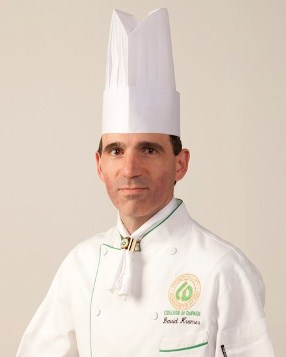 Chef David Kramer, associate professor of culinary arts at the College of DuPage in Glen Ellyn, Ill., is one of six chefs and foodservice professionals nationwide to win a 2012 United Fresh Produce Excellence in Foodservice Award. Nominated by Chicago-based Testa Produce, Inc., Kramer won in the Business in Industry & Colleges category. The awards program, created by the United Fresh Produce Association and sponsored by PRO*ACT, honors chefs and their companies for innovative and influential use of produce in the culinary arts.
Chef David Kramer, associate professor of culinary arts at the College of DuPage in Glen Ellyn, Ill., is one of six chefs and foodservice professionals nationwide to win a 2012 United Fresh Produce Excellence in Foodservice Award. Nominated by Chicago-based Testa Produce, Inc., Kramer won in the Business in Industry & Colleges category. The awards program, created by the United Fresh Produce Association and sponsored by PRO*ACT, honors chefs and their companies for innovative and influential use of produce in the culinary arts.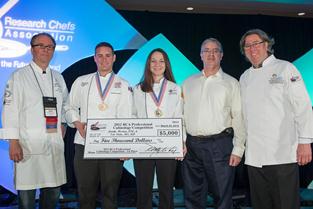 The team of Eric Stein, M.S., R.D., a chef-instructor at the Kendall College School of Culinary Arts, and Jaime Mestan, C.S.C., a Kendall College culinary alum (‘08) and research chef at Ed Miniat, Inc., in South Holland, Ill., took first place in the inaugural Professional Culinology® Competition, March 23 in San Antonio, Texas, held in conjunction with the Research Chefs Association’s (RCA) Annual Conference and Culinology® Expo.
The team of Eric Stein, M.S., R.D., a chef-instructor at the Kendall College School of Culinary Arts, and Jaime Mestan, C.S.C., a Kendall College culinary alum (‘08) and research chef at Ed Miniat, Inc., in South Holland, Ill., took first place in the inaugural Professional Culinology® Competition, March 23 in San Antonio, Texas, held in conjunction with the Research Chefs Association’s (RCA) Annual Conference and Culinology® Expo.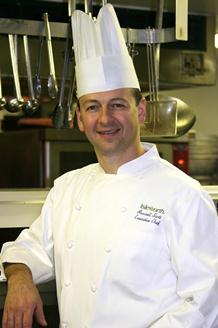 Russell Scott, one of only 66 Certified Master Chefs in the United States, has been named dean of education of The Culinary Institute of America (CIA) at Greystone, effective April 2, 2012. In his new role, Scott will be responsible for the quality and effectiveness of all education programs at the CIA campus in St. Helena, Calif. He will oversee faculty and staff on the education team, direct the development and delivery of the curriculum, and lead the support of students enrolled in the campus’ degree and certificate programs.
Russell Scott, one of only 66 Certified Master Chefs in the United States, has been named dean of education of The Culinary Institute of America (CIA) at Greystone, effective April 2, 2012. In his new role, Scott will be responsible for the quality and effectiveness of all education programs at the CIA campus in St. Helena, Calif. He will oversee faculty and staff on the education team, direct the development and delivery of the curriculum, and lead the support of students enrolled in the campus’ degree and certificate programs.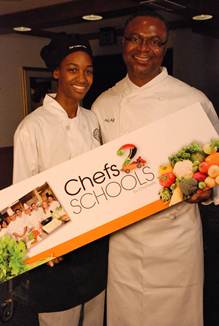 Culinary students at Warren Central High School, Indianapolis, Ind., cooked up a storm at the First Annual Junior Chef competition on March 6. Sponsored by Chartwells School Dining Services, the foodservice provider for MSD Warren Township, the students were honored to be supervised by Chef Cary Neff, vice president, Corporate Culinary Services, Morrison Management Specialists, which provides food, nutrition and dining services to the healthcare and senior-living industries.
Culinary students at Warren Central High School, Indianapolis, Ind., cooked up a storm at the First Annual Junior Chef competition on March 6. Sponsored by Chartwells School Dining Services, the foodservice provider for MSD Warren Township, the students were honored to be supervised by Chef Cary Neff, vice president, Corporate Culinary Services, Morrison Management Specialists, which provides food, nutrition and dining services to the healthcare and senior-living industries.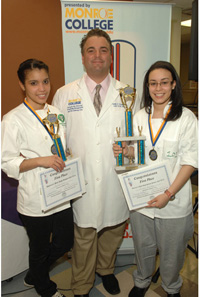 On March 3, 31 high-school students from throughout the New York metro area competed for the distinguished titles of America’s Best High School Chef and Pastry Chef in the fourth-annual competition sponsored by the Monroe College School of Hospitality Management and the Culinary Arts in the Bronx.
On March 3, 31 high-school students from throughout the New York metro area competed for the distinguished titles of America’s Best High School Chef and Pastry Chef in the fourth-annual competition sponsored by the Monroe College School of Hospitality Management and the Culinary Arts in the Bronx.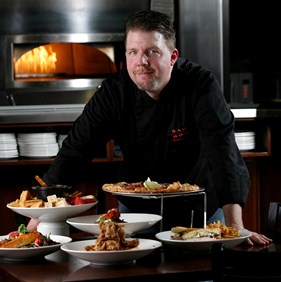 The executive chef of two-unit Saul Good Restaurant & Pub in Lexington, Ky., admits to learning a lot of hard lessons about how chefs and owners should get along, but he’s gotten a crash course in doing it the right way from founder Rob Perez. Chef Mayer shares some insights into why he believes “ours is not the typical owner-operator and chef relationship.”
The executive chef of two-unit Saul Good Restaurant & Pub in Lexington, Ky., admits to learning a lot of hard lessons about how chefs and owners should get along, but he’s gotten a crash course in doing it the right way from founder Rob Perez. Chef Mayer shares some insights into why he believes “ours is not the typical owner-operator and chef relationship.”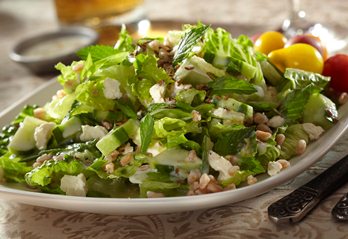 Mediterranean salads top the list when casual diners seek change.
Mediterranean salads top the list when casual diners seek change.